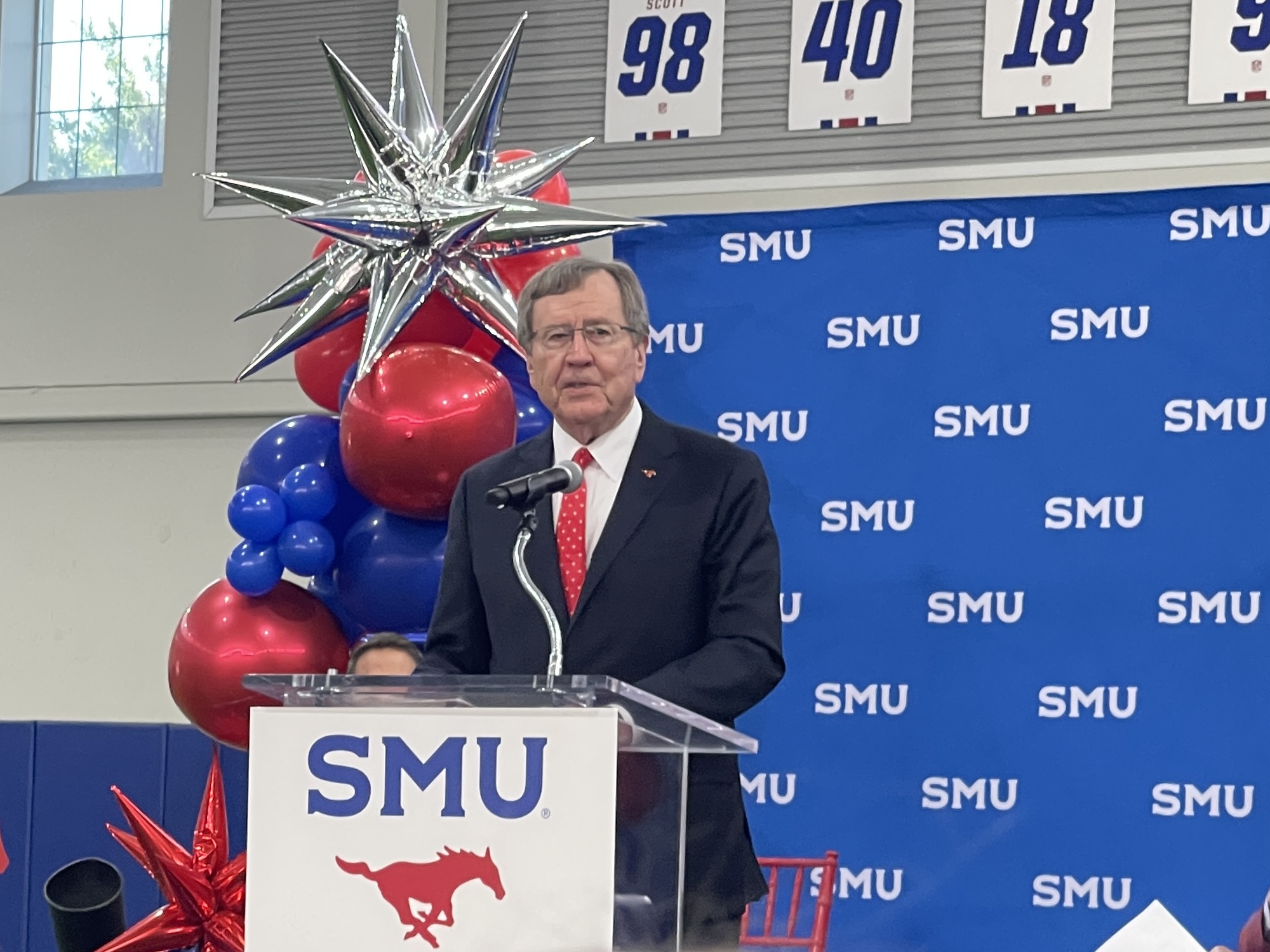DALLAS (SMU) – SMU has accepted an invitation to join the Atlantic Coast Conference in all sports, President R. Gerald Turner announced September 1, 2023.
“Joining the Atlantic Coast Conference is an historic milestone in our institution’s history, and the start of a new chapter in SMU Athletics,” said SMU President R. Gerald Turner.
SMU will join alongside the University of California, Berkeley (Cal) and Stanford University after the ACC Board of Directors voted to formally admit the three schools. The trio will join the ACC as full members with full voting participation effective July 1, 2024 (SMU) and August 2, 2024 (Stanford and Cal).
“From early on in my tenure here on the Hilltop, we had a vision to reestablish SMU Athletics as a nationally recognized and relevant program, one to complement our outstanding academic reputation,” said Turner. “We set out to return SMU Football to campus and to build Ford Stadium, and later to increase operating support with the Circle of Champions and the Vision 2025 Fund – things we could not have done without the support of our Board of Trustees and the financial support of so many generous donors. It is truly an exciting time on the Hilltop.”
SMU has a long and storied history of program-wide success, boasting nine overall national championships, almost 200 team conference championships, over 100 individual national championships, more than 150 NCAA top-10 finishes, nearly 2,000 All-American honors and over 150 Olympic appearances. Over just the past decade, all of SMU’s 17 programs have reached the postseason and 15 different programs have won conference championships. SMU is the only NCAA FBS program in Dallas, and, since 2013, has invested over $250 million to develop and enhance championship-caliber facilities.
“This is such an important day for SMU. Becoming a member of the ACC will positively impact all aspects of the collegiate experience on the Hilltop and will raise SMU’s profile on a national level,” said SMU Board Chair David B. Miller ’72, ’73. “SMU is committed to excellence in everything we do, and this move will strengthen that commitment. I want to thank everyone who has helped position SMU for this important moment because a moment like this doesn’t just happen. It is the culmination of the collective investments made by many over a long period of time – investments in infrastructure, in programs, and in people. We made these investments because while doing so did not guarantee an outcome, not doing so almost certainly would. Now, we are thrilled to have this opportunity and are excited for our future. SMU is ready to bring ACC Championships home to Dallas.”
The Atlantic Coast Conference, now in its 71st year of competition and 15 members strong, has long enjoyed the reputation as one of the strongest and most competitive intercollegiate conferences in the nation. ACC members Boston College, Clemson, Duke, Florida State, Georgia Tech, Louisville, Miami, North Carolina, NC State, Notre Dame, Pitt, Syracuse, Virginia, Virginia Tech and Wake Forest continue to build upon the cornerstones on which the league was founded in 1953 with a consistent balance of academics, athletics and integrity. The ACC currently sponsors 28 NCAA sports – 15 for women and 13 for men – with member institutions located in 10 states. ACC schools have captured 173 NCAA team championships, including 87 in women’s competition, 82 in men’s sports and four in fencing. In addition, NCAA individual titles have gone to ACC student-athletes 196 times in men’s competition and 181 times in women’s action. The ACC leads all Autonomy 5 conferences with 15 women’s sports offerings, and no conference offers more than the league’s 28 total sponsored sports.
“As we move forward though, I want to thank Mike Aresco for his leadership of the American Athletic Conference,” Turner said. “He, the conference staff and the league’s institutions have helped build a great brand and conference; that also helped propel SMU Athletics forward.”
“Arriving at this point required vision, commitment, action and leadership,” said SMU Director of Athletics Rick Hart. “For nearly three decades, President Turner and our Board of Trustees have provided just that. Under their direction and through the generosity of our alumni and donors, SMU built Gerald J. Ford Stadium, the Loyd All-Sports Center, the Miller Event Center, Armstrong Fieldhouse, the Crum Basketball Center, the Styslinger/Altec Tennis Complex, the Payne Stewart Golf Training Center, Washburne Stadium, the Robson & Lindley Aquatics Center and Barr-McMillion Natatorium and the Holt Hickman Outdoor Pool and completely renovated Moody Coliseum.
“President Turner embraced and supported our commitment to a student-athlete experience that rivals the best in the country – access to meaningful degree programs; degree completion aid; medical and mental health support; full cost of attendance; mentors, internships, and career preparedness. He was also a driving force, alongside Mike Aresco, in the establishment and rise of the American Athletic Conference.
“We can also never repay our Board Chair and basketball letterwinner David Miller for his support, guidance and commitment to this journey,” said Hart. “The Miller name adorns many of SMU’s best-in-class facilities because of his family’s long-standing and ongoing financial support of both academic and athletic progress, but many may not realize the countless hours of travel, meetings, phone calls and other work he performed to get us across this finish line.
“I can confidently say that without the decades-long vision, commitment, action and leadership by so many loyal Mustangs, we would not have been positioned to seize this opportunity and we would not be here celebrating membership in the Atlantic Coast Conference today.”
The addition of Cal, SMU and Stanford enhances and strengthens the ACC academically, athletically and financially, and creates a true national conference that spans coast to coast. The incoming universities enrich the league’s competitiveness in all sports and further demonstrate the ACC’s commitment to broad-based programs for both women and men. More than 2,200 student-athletes from Cal, SMU and Stanford will join the nearly 10,000 current ACC student-athletes competing at the highest level of intercollegiate athletics.
“In addition to its influence on our Athletics programs, being formally associated with the outstanding academic institutions in the ACC will also be beneficial to the academic community of SMU,” Turner added.
“This is a significant day for the ACC as we welcome Cal, SMU and Stanford to this incredible conference,” said University of Virginia President James E. Ryan, chair of the ACC Board of Directors. “This expansion will enhance and strengthen the league now and in the future. We greatly appreciate the tireless efforts of Commissioner Jim Phillips throughout this entire process, especially his focus on minimizing travel burdens for student-athletes, and we are excited about the ACC’s collective future.”
“We are thrilled to welcome three world-class institutions to the ACC, and we look forward to having them compete as part of our amazing league,” said ACC Commissioner Jim Phillips, Ph.D. “Throughout the evaluation process, the ACC Board of Directors, led by President Ryan, was deliberate in prioritizing the best possible athletic and academic experience for our student-athletes and in ensuring that the three universities would strengthen the league in all possible ways. Cal, SMU and Stanford will be terrific members of the ACC and we are proud to welcome their student-athletes, coaches, staff and entire campus community, alumni and fans.”
A nationally ranked private university located near the heart of Dallas, SMU is a distinguished center for global research and teaching. SMU’s more than 12,000 diverse, high-achieving students come from all 50 states and over 80 countries to take advantage of the University’s small classes, meaningful research opportunities, leadership development, community service, international study and innovative programs. SMU’s relationship with Dallas – the dynamic center of one of the nation’s fastest-growing regions – offers unique learning, research, social and career opportunities that provide a launch pad for global impact.
SMU serves approximately 7,000 undergraduates and 5,000 graduate students through eight degree-granting schools: Cox School of Business, Dedman College of Humanities and Sciences, Dedman School of Law, Lyle School of Engineering, Meadows School of the Arts, Moody School of Graduate and Advanced Studies, Perkins School of Theology and Simmons School of Education and Human Development.











